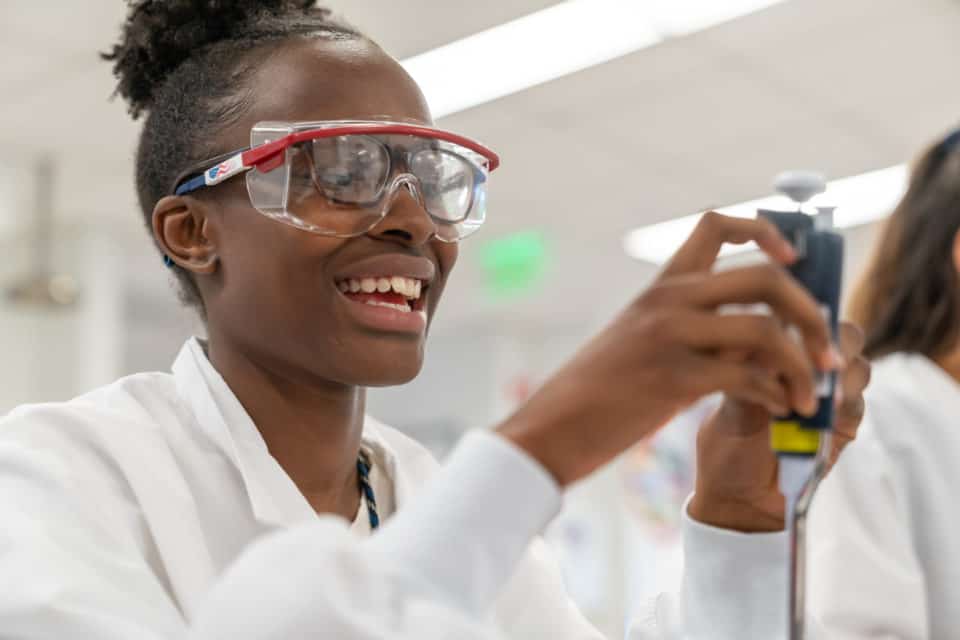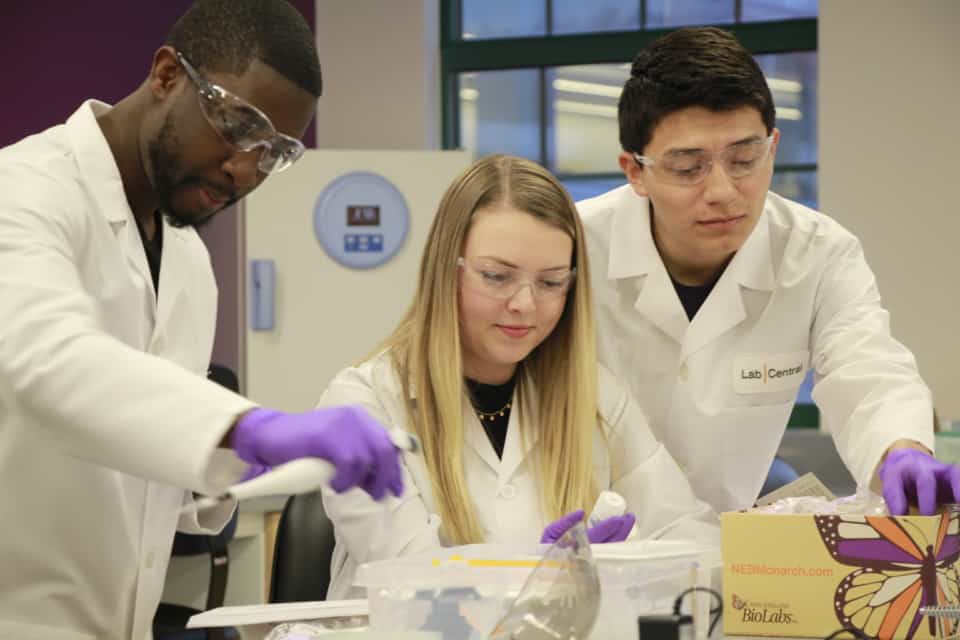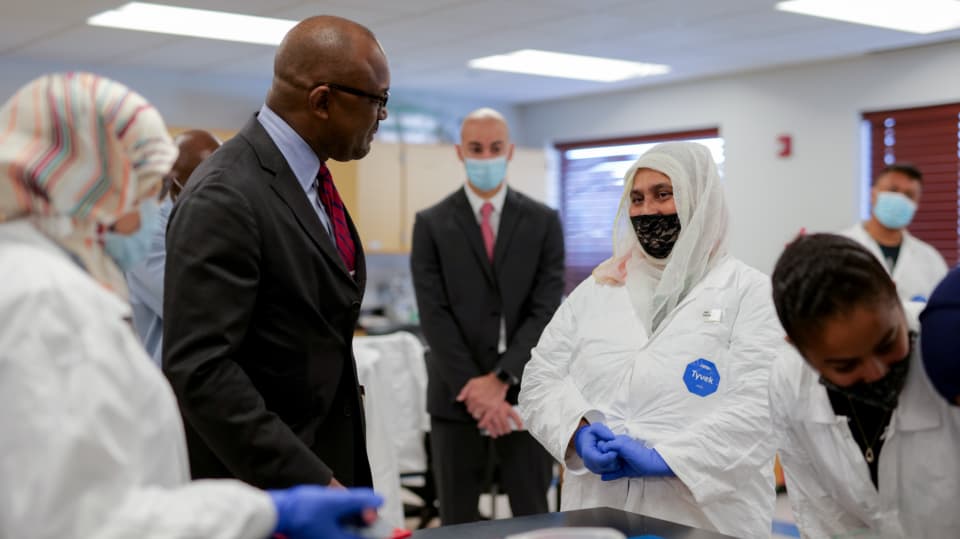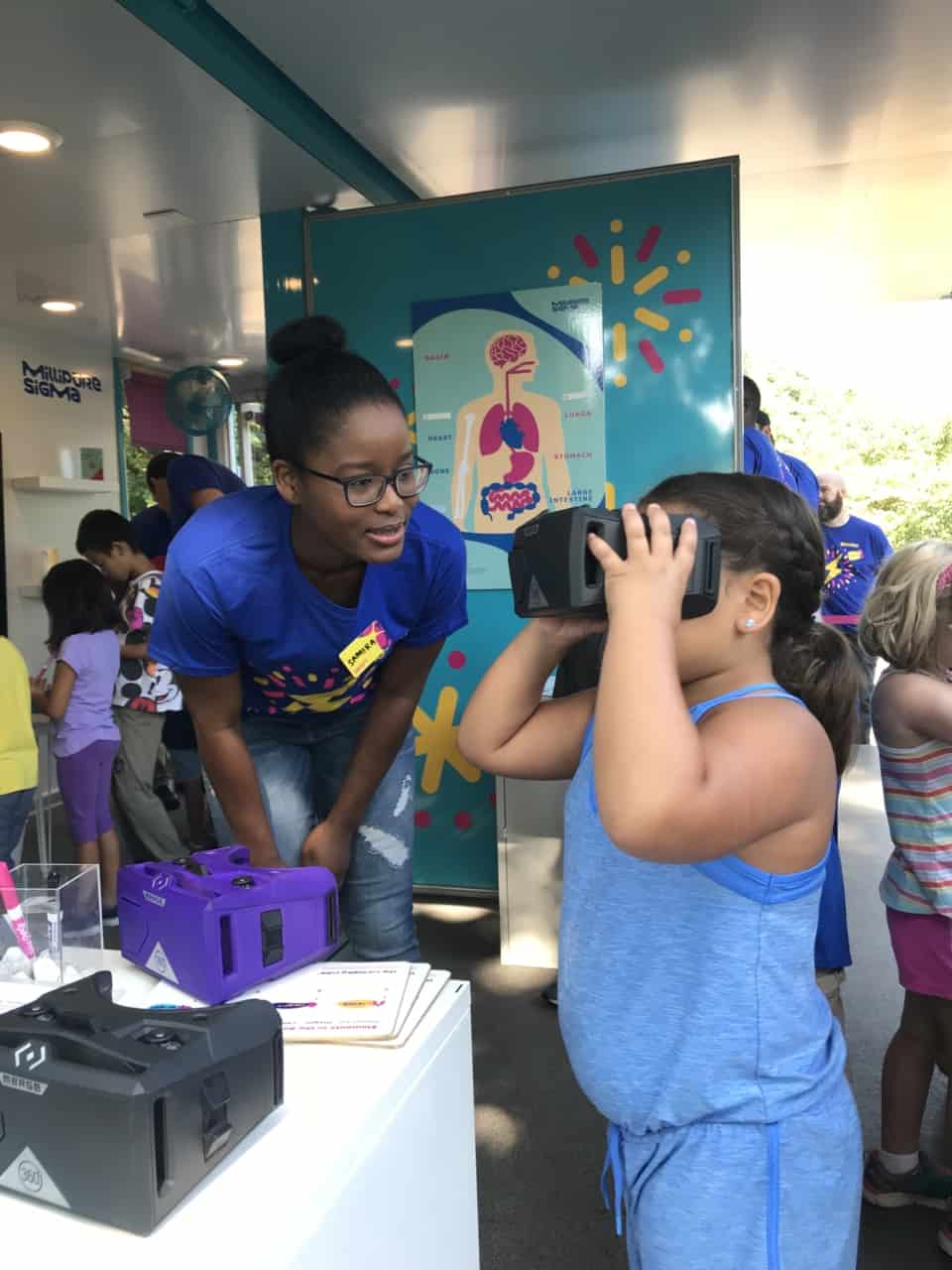News
A Conversation Between an Educator and Industry Leaders on Partnerships and Diversity as Critical Factors to the Success of the Life Sciences
Without collaboration, our life sciences ecosystem would not be what it is today, with thriving connections between academia, industry, and government. These kinds of partnerships bring a variety of unique perspectives together and are crucial to creating accessible opportunities for new and diverse talent. We sat down with Kenn Turner, President and CEO of the Massachusetts Life Sciences Center; Andre Williams, a Biotechnology Instructor at East Boston High School; and Renee Connolly, Chief Diversity, Equity & Inclusion Officer at Merck, KGaA to hear about the different perspectives in partnering within the life sciences and on why diversity is so important as we look to the future of the industry.
At MassBioEd, we are proud to work closely with our partners who are all committed to strengthening life sciences education and workforce development. We looked at how our strategic partners are tackling the challenges to building a strong workforce in a variety of ways beyond their partnership with MassBioEd. Read about the programs and initiatives of Biogen, LabCentral, Massachusetts Life Sciences Center, and MilliporeSigma, and see the work they are doing to help foster an inclusive and prosperous industry.
Biogen

Biogen is driven by their commitment to patients and their passion for neuroscience. As one of the world’s first global biotechnology companies, Biogen discovers, develops, and delivers worldwide innovative therapies for people living with serious neurological and neurodegenerative diseases as well as related therapeutic adjacencies. The company is also dedicated to inspiring the next generation of scientists through STEM education. Since 2002, the Biogen Foundation has been committed to sparking a passion for science and discovery, supporting effective science education initiatives, and strengthening efforts to make science education and science careers accessible to diverse populations. The Community Lab is a signature example of the company’s commitment to STEM education, serving over 60,000 students from the community, including groups historically underrepresented in science with hands-on learning. Most recently, Biogen launched its Virtual Community Lab curriculum in collaboration with Lemelson-MIT to bring online lab simulations and mentoring experiences focused on biotechnology and neurological diseases, such as Parkinson’s disease, to students and teachers. In 2018, the Biogen Foundation also launched the STAR initiative, an investment of $10 million to help catalyze the development of local STEM ecosystems and drive education equity in Cambridge and Somerville. In addition, in 2019, the Biogen Foundation began the support of the Massachusetts General Hospital Youth Neurology program, empowering students in high school and college to study neuroscience and neurology. Biogen and the Biogen Foundation are also valued MassBioEd partners, granting over $250,000 over the past ten years.
LabCentral

LabCentral is a Massachusetts non-profit company, founded in 2013 as a launchpad for high-potential life sciences and biotech start-ups. Operating over 100,000 sq. feet in Cambridge and on the Harvard University campus, LabCentral offers a network of fully permitted laboratory and office spaces for as many as 100 start-ups comprising approximately 500 scientists and entrepreneurs. Earlier this year, they launched LabCentral Ignite, a new initiative with the goal of enhancing regional biotech innovation by stimulating a robust pipeline of diverse, qualified talent. Through internal programming and grants to nonprofits focused on STEM education, workforce training and entrepreneurial development, LabCentral Ignite will facilitate broader access to the biotech industry, with emphasis on socioeconomically disadvantaged, underserved, and under-represented individuals and communities.
LabCentral Ignite is a proud supporter and partner of MassBioEd. In an initial round of investments in 2020, MassBioEd was one of ten impactful organizations that received a grant from LabCentral. Beyond financial support, LabCentral provides MassBioEd’s BioTeach program access to their Learning Lab, which comprises 1,270 square feet of laboratory and adjoining classroom space. Through the Learning Lab, BioTeach is able to give life science educators hands-on lab experience in a state-of-the-art facility. The Learning Lab will also be used for an exciting new program that LabCentral Ignite will be hosting in partnership with BioTeach, the “What the Heck is Biotech?” community workshops to identify candidates for LabCentral Ignite’s Career Forge program, which aims to assess and place underrepresented talent into entry-level biotech roles. By continuing to work with organizations like MassBioEd, LabCentral Ignite is confident that the biotech industry can become one that is accessible for and representative of all residents of Massachusetts.
Massachusetts Life Sciences Center (MLSC)

The MLSC is bullish on their commitment that the next generation has the resources, education, and training to cultivate a talent pipeline that is unmatched by any other life sciences ecosystem. The MLSC’s work can be seen across a number of their initiatives including the STEM Equipment and Professional Development program enabling middle schools and high schools to educate students in real-world scenarios that will prepare them for career opportunities in the life sciences while also providing teacher professional development opportunities to receive the technical training needed to effectively use newly acquired equipment and technology. The MLSC also facilitates and funds paid internship opportunities at small life sciences companies for high school and college students.
Just as important are the deep partnerships the MLSC fosters with fellow nonprofits and industry leaders like MassBioEd. Since 2012, the MLSC has provided MassBioEd with over $1.2 million in grants to support biotechnology education at over 60 economically disadvantaged high schools and middle schools throughout Massachusetts. This funding has enabled schools to purchase state-of-the-art lab equipment and offer professional development opportunities for teachers. This investment includes recent partnerships with the school districts of Boston, Lawrence, Salem, Chelsea, and Randolph, each of which received grants to implement MassBioEd curricula.
MilliporeSigma

MilliporeSigma is committed to accelerating access to health for people everywhere, while sparking curiosity in the next generation. It accomplishes this through philanthropic investments in science education, global access to science, and scientific research. The company’s longstanding partnership with MassBioEd is just one example.
Simultaneously, MilliporeSigma harnesses the diverse expertise of its employees, allowing them to give back to their communities through its SPARK™ global volunteer program. MilliporeSigma turns scientific curiosity into action via Curiosity Labs™, Curiosity Labs™ at Home, and the Curiosity Cube®, its signature science education programs. The programs have been modeled on the principles of diversity, equity, and inclusion since they began. They focus on equity and inclusion, especially for underrepresented populations in science, including people of color and women. This includes ensuring that MilliporeSigma is modeling this behavior through diverse leaders and volunteers for its STEM programs.
The Curiosity Labs™ program empowers employee volunteers to deliver hands-on science lessons to students inside the classroom. Since 2016, it has reached more than 45,500 students in 25 countries. The Curiosity Labs™ at Home program provides a number of easy, educational hands-on science experiments that can be completed at home with materials found around the house, bringing science to students anytime and anywhere. The Curiosity Cube®, a retrofitted shipping container turned mobile science lab, travels North America bringing students out of the classroom and into the lab for an immersive hands-on STEM experience. Since 2017, the Curiosity Cube® has reached more than 114,500 visitors.
MilliporeSigma’s STEM education programs share MassBioEd’s goals to bring engaging, hands-on experiences to students in the classroom to spark curiosity in science. MilliporeSigma employee volunteers participating in career exploration experiences are a critical part of making it real for students to see themselves in science.

 MassBioEd
MassBioEd